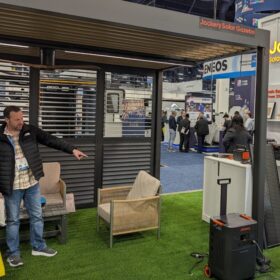Renewables Forward, a diversity, equity, and inclusion (DEI) initiative of leading U.S. renewable and clean energy companies, released what it is calling a DEI playbook.
The publication offers steps that renewable and clean energy companies can take to tackle diversity and inclusion within their organizations and across the solar and clean energy industry. Among other things, it includes steps for “unconscious bias training, inclusive recruiting practices, and enhancements to performance reviews and promotional processes.”
Liz Weir, Chief Operating Officer for Sol Systems, said, “This HR playbook represents the strength of a united front and the dedication of our member companies to move beyond general discussion of DEI issues and drive actual, tangible change in our solar businesses.”
The group said it more than doubled in membership to 28 with the addition of 16 new member companies and organizations: 3Degrees, Act Power Services, Amicus Solar Cooperative, Amicus O&M Cooperative, Edison Energy, Empower Energies, Energy Storage Association, Infrastructure Finance Advisors, Leyline, MD Strategic, OneEnergy Renewables, Plante Moran, Safari Energy, Sphere Solar, SunCommon, and Sun Tribe.
Renewables Forward launched in October around four principles:
- Assess diversity and inclusion in industry to raise awareness around inequality and benchmark progress toward a more diverse and inclusive industry.
- Develop and share corporate practices and policies for a consistent drive toward increasing diversity and inclusion within companies and the industry.
- Create a more diverse and inclusive pipeline of candidates in the renewable energy industry.
- Invest in the under-resourced and minority communities.
Founding members include Capital Dynamics, Cypress Creek Renewables, EDF Renewables, Generate Capital, Mosaic, Nautilus Solar Energy, New Columbia Solar, Nextracker, Sol Systems and Volt Energy, as well as the Solar Energy Industries Association and The Solar Foundation.
Updating interconnection rules
The National Renewable Energy Laboratory (NREL) offered technical help to Michigan regulators to revise and streamline interconnection rules that had not been uodated since 2009.
In 2018, the state’s two big utilities saw high growth in requests for grid interconnection to solar and other DERs. In previous years, the state’s total operating solar generation had been just over 100 MW, but more recent requests amounted to 3 GW.

Dennis Schroeder/NREL
NREL engineers Michael Ingram and David Narang first began discussing interconnection challenges with MPSC in 2019 and have provided technical assistance since then.
Using Minnesota’s experience as a reference point to update the Michigan rules, Ingram and Narang developed a two-part plan.
The first objective was to help staff understand technical requirements of DERs based on IEEE Standard 1547-2018. The standard provides technical specifications and configurations to help utilities, grid operators, and other stakeholders think through interoperability and communications details to safely integrate DERs into the electric grid.
The second objective was to help Michigan’s utilities evaluate the pre-application report that provides technical details about their distribution system—such as feeder locations and voltages—to help determine how new DERs would affect the grid.
Throughout 2020, MPSC worked through its updated interconnection rules with stakeholder groups to finalize a draft to begin the formal rule-making process.
MPSC also contributed to NREL’s new “Guide for Authorities Governing Interconnection,” which is under review at the U.S. Department of Energy.
Tigo Energy investment round
Tigo Energy, which produces Flex-MLPE (Module Level Power Electronics) announced a $20 million round of investment led by Energy Growth Momentum.
The investment will be used to improve upon existing products and develop next generation solutions that maximize returns for PV customers. A portion of the new funds will be used to scale up operations. Tigo said its growth has “accelerated significantly” recently as the company’s products have reached more customer segments and countries globally.
Tigo’s products are used in PV systems that range from residential solar to utility scale sites, roof-top, ground mount and floating systems.
This content is protected by copyright and may not be reused. If you want to cooperate with us and would like to reuse some of our content, please contact: editors@pv-magazine.com.









Maybe NREL and the U.S. should look to Australia for help in clearcutting away the redtape.
There rooftop solar is $1/W compared to here where it is closer to $3/W.